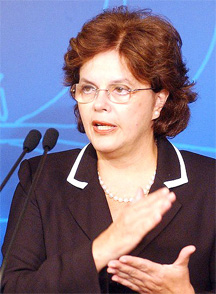BRASILIA, (Reuters) – Since taking office on New Year’s Day, Brazilian Presi-dent Dilma Rousseff has told a procession of surprised American visitors over coffee that she wants to end a decade of mistrust and build a new strategic alliance with the United States.

The shift, which initially shocked U.S. and Brazilian diplomats, is behind President Barack Obama’s hastily planned visit to Brazil this week. Both sides see a historic chance to bring the Western Hemisphere’s two heavyweights closer together with major implications for energy, trade and defense.
The issues that pushed the two apart — trade disputes, Brazil’s growing clout in global affairs and its ties with Iran and other anti-U.S. governments — haven’t gone away.
But economic changes, including the rise of China and stubbornly high U.S. un-employment, have forced new priorities on Obama and Rousseff, and both sides seem convinced they need each other more than ever.
Rousseff told Treasury Secretary Timothy Geithner just that over coffee in her office last month, explaining that Brazil and the United States must cooperate more as the global balance of power tilts toward emerging markets in Asia.
“Brazil is a Western country” and shares a common set of values and interests with the United States, Rousseff told Geithner, according to officials from both countries with direct knowledge of the conversation.
Rousseff said she wants to work with Obama to reverse a relative decline in bilateral trade in the last few years, and explore other initiatives that she said could help Brazil become a middle-class country by the end of this decade.
It was a marked departure from the tone of her predecessor, Luiz Inacio Lula da Silva, who is from the same leftist party but often attacked U.S. policies and pursued alliances with developing nations including China, Venezuela and Iran, a stance that antagonized Washington.
The spontaneity of this weekend’s visit — a Brazil trip was hardly discussed in Washington as recently as January — is a sign of how eager Obama is to seize the moment.
The large delegation re-flects the promise Washington sees in Latin America’s largest economy — especially at a time when Obama is touting exports as a path to creating U.S. jobs.
The group is set to include Geithner, Commerce Secre-tary Gary Locke, Energy Secretary Steven Chu, and U.S. Trade Representative Ronald Kirk. Many will stay on longer in Brazil rather than follow Obama to Chile and El Salvador.
Rousseff believes closer ties and a united front with the United States could help persuade China to strengthen its currency and slow a wave of cheap imports that is pummeling local industry. Washing-ton hopes Brazil can be a much-needed counterweight to China in Latin America, Africa and beyond.
“Presidential visits are always important, but this one is critical,” a senior Brazilian official said. “The way the stars are aligned, this happens very rarely. It could be years before there is another opportunity this good.”
LEGACY OF MISTRUST
However, the high hopes have put pressure on both sides to make progress in a relationship that hasn’t truly been close for 10 years. Some in Rousseff’s government still think Brazil’s booming economy and ascendancy on the global stage naturally put it at odds with Washington, which they see as a decaying power unwilling to accommodate newcomers.
Rousseff also has a reputation as a tough, results-based taskmaster who will want more than just fuzzy platitudes to point to once Obama leaves town.





